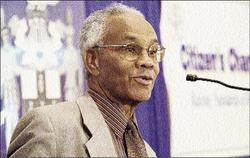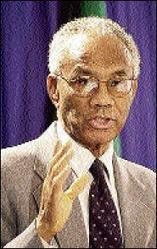Edmond Campbell, News Coordinator

The country's first executive Cabinet secretary, Dr Carlton Davis, who worked alongside three prime ministers and served in the bauxite industry under the Edward Seaga administration of the 1980s, is to go on retirement soon.
After 40 years of unbroken service as a public servant, Davis will retire on February 29, but could stay on until April 30, 2008, to facilitate the appointment of his successor and a smooth transition.
The only Cabinet secretary to have served under three prime ministers, Davis has held the position from 1993 to the present, under both the People's National Party (PNP) and Jamaica Labour Party (JLP) administrations.
Davis has worked as Cabinet secretary with PJ Patterson, Portia Simpson Miller and current Prime Minister, Bruce Golding.
During his tenure, Davis has seen dramatic shifts in the delivery of service to the public, but concedes that there is need for greater improvement.
A stalwart in the bauxite industry, the scientist-turned-head of the public service has chaired the Jamaica Bauxite Institute (JBI) for 35 years.
The bauxite sector is the country's third-largest foreign-exchange earner, raking in more than $1 billion a year in gross foreign-exchange earnings. The country's number-one foreign-exchange earner is tourism, followed by remittances.
Showered with accolades
The year 1990 was the annus mirabilis for Davis. It was a year in which he received a national award and was showered with accolades by several groups.
He received the country's fourth-highest award, the Order of Jamaica, the Jamaica Institute of Management's Manager of the Year, The Gleaner Honour Award, and the Scientific Research Council award.
"Of course, I was honoured. I am not one of those who set these things as an objective. If they come along they come along, but I thought, I felt honoured that the Government should recognise me (and) The Gleaner, which represents by general consent, the best of the private sector and is quite critical," he adds.
He was also chairman of the National Housing Trust (NHT) between 1989 and 1993. He has been chairman of the Jamaica Special Olympics since 1989.
"I was carrying these things and certainly in both the bauxite sector and the National Housing Trust, I was very much in the public view," he says.
"I believe a lot of people are doing good work but they are not in the public view. I must have been doing a reasonably good job, so I felt very honoured."
When he was offered the job as Cabinet secretary, Davis hesitated at first, contemplating how he would make the transition from the field of science to the Cabinet office.
The Patterson administration made the decision to adopt a model of Cabinet secretary used in the United Kingdom, Canada and Australia.
Under this model, Cabinet secretary is an executive position. The person holding the position also heads the public service.
"It was a learning experience. Mr Patterson was very supportive because he is very good on governance and these sorts of matters."
In terms of his contribution as Cabinet secretary, Davis says the reforms that led to the creation of executive agencies and the strengthening of the Office of the Cabinet to make it more effective in the management of the country's business rank high on his list of achievements.
Under the US$28-million World Bank-funded Public Sector Modernisation Programme (PSMP), several government departments were converted to executive agencies, an initiative Davis describes as a "major turning point" in the delivery of service to the public.
He says the reorganisation of the Cabinet Office was the second pillar of the reform objective.
The change to executive-agency status began in 1999 and according to Davis, the agencies have become more efficient and have, in a few years, paid back the investment made in them.
"They were able to increase fees without the public being particularly upset and that came about because they saw better customer service, more efficient service and people were giving them value for money. So overall, we thought that this was one of our important transformations."
After 15 years in the job as Cabinet secretary, Davis says his experience in working with three prime ministers has been invaluable.
"I think they all recognise that this is part of a benchmark way of managing the public sector - to have some centre that keeps an eye on the other areas to make sure that the policies and programmes are consistent with the Government's priorities," he says.
"I think that of all three, Mr Patterson perhaps (was) easiest (to work with) because he was a co-founder since it (reform) started under Mr (Michael) Manley. Mrs Simpson Miller was a member of the Cabinet and then Mr Golding, who was out of office for 18 and a half years, it was important that he saw the merit in the approach and I believe he is now supporting it."
Holding the post of Cabinet secretary is not without its challenges, and Davis reveals that sometimes he finds himself in the line of fire.
"You find you become a sort of point of reference for all sorts of things and you have to try to manage that. You become a trouble shooter, and the point is that because you are a point of reference, you can be overloaded with trouble-shooting functions that can make you lose sight of your core functions," Davis adds.
Accountable to the public

Dealing with politicians on the one hand as Cabinet ministers, public sector bureaucrats on the other, and being accountable to the public, is a challenge, which the veteran public servant has had to handle on a regular basis.
"It is challenging to balance the roles. You have to be responsive to what the government of the day wants you do try to influence, one way or the other, if you have a point of view which they should consider."
While serving as chairman of the NHT, Dr Davis instituted the 'Best Kept Scheme' initiative that created competition among communities.
The scheme helped to instil a sense of pride in residents who worked relentlessly to keep their communities and their environs clean while beautifying the landscape.
Davis is recommending that the current board of the NHT revitalise the programme.
Turning to the bauxite sector, the JBI chairman says he has completed two volumes of work on the industry and is now completing the last three chapters of the joint venture and partnerships agreement in the bauxite sector. A fourth volume will be written after he retires.
"That would have at least four documents of record for scholars or people in government to have as a point of reference on what has transpired in the sector," he explains.
Asked what his plans are for retirement, Davis says he intends to make some money "because like media workers, we are not ever going to be wealthy people".
Davis and his siblings, Omar, Rae and Jennifer McDonald, have all contributed to the public service.
Dr Omar Davies was the former minister of finance, now Opposition spokesman on finance; Dr Rae Davis was a former president of the University of Technology; and, Jennifer McDonald works with the Civil Aviation Authority.
edmond.campbell@gleanerjm.com

